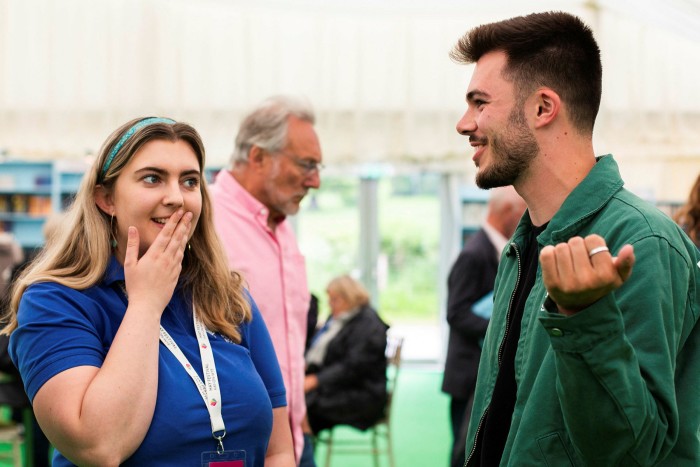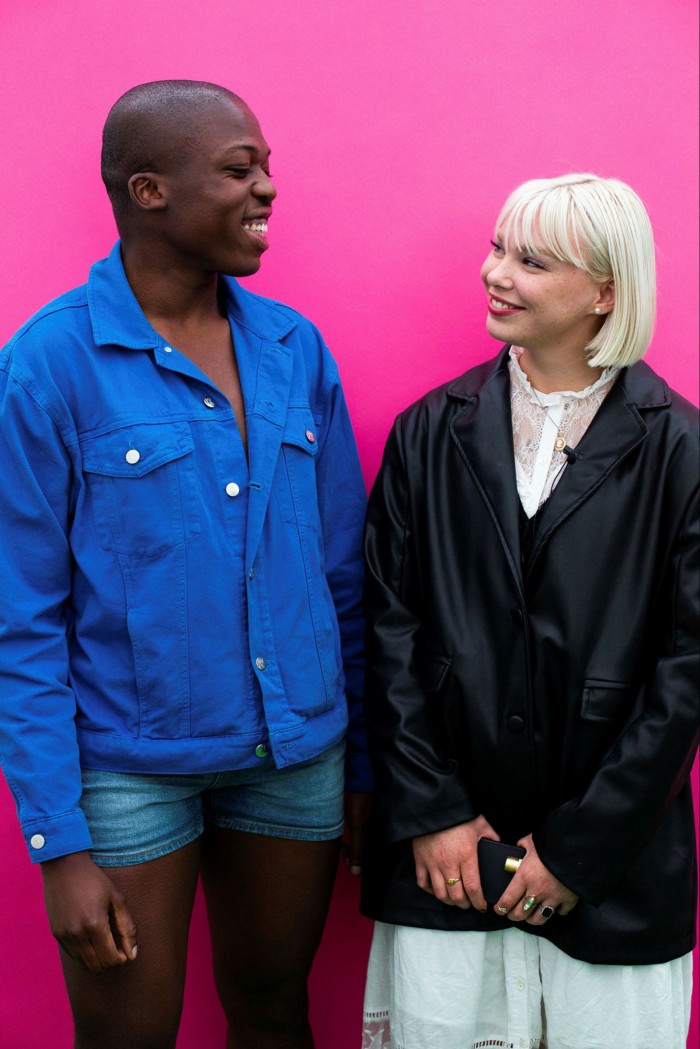Is BookTok set to revolutionise the publishing industry?


Roula Khalaf, Editor of the FT, selects her favourite stories in this weekly newsletter.
It’s been the question that has long bugged publishers: how to get to grips with the potential of social media in all its bewildering expressions and platforms. The commercial rewards are obvious; how to get there, less so.
This week, the literary world had a chance to learn more about the dark arts of virality when BookTok pitched its figurative tent at the Hay Festival on the Welsh borders. The literary chapter of the wildly popular TikTok video-sharing app is the new “digital media partner” of the festival, which returned with a flourish for its first full “in person” gathering since 2019.
While many aspects of the festival are familiar — respectful mac-clad enthusiasts; dodgy weather; the eclectic range of events, from snatches of Bach illuminating a memoir to awkward questions for big-name authors about how to avoid writing yourself into the Bad Sex awards — the arrival of BookTok struck a different tone.
The clutch of twenty-something BookTok stars brought with them refreshing fashions and party poses — dance-floor splits amid a swirl of crushed linens — along with an impressive power to inspire enthusiasm for books.

According to the Chinese-owned platform, BookTok videos — typically a very short film in which people share their favourite reads — have clocked up 55.9bn views over the past four years. They are also driving sales: in Hay, where the BookTok selection in the festival bookshop sold out almost daily; and more generally across the industry, where publishers credit the platform with boosting revenues.
Upbeat and highly personalised, BookTok has given a new lease of life to old titles, such as The Song of Achilles, Madeline Miller’s 2011 take on The Iliad; it has also boosted debut authors. Popular genres include fantasy, crime, LGBT literature and poetry.
How does it work? Talk to the “creatives” and it’s about honesty, integrity and a willingness to engage. Jack Edwards highlights the power of recommendations: “reading a book is a big commitment. BookTok helps you get there.” For Dakota Warren, it’s also a “very wholesome” community, a refuge from the bile elsewhere on social media. And unlike more stuffy bookish environments, adds Benjy Kusi, the “barrier between us and them feels thinner . . . it’s a lot easier.”
TikTok talks about offering a different model of social media, one where the impact of a post is less dependent on your number of followers than the number of likes you get. In the parlance, it’s “a content graph rather than a social graph”. Ultimately, though, for an advertising funded site, it’s all about attracting and keeping eyeballs. And some social media norms still seem to apply: Dakota and Jack say they get most engagement for posts in which they are critical.

While it’s easy to query the place of BookTok in the elevated world of letters, its breezy argot is not a million miles from some of the breathless releases emanating from publicity-seeking publishers. Besides, no one is sniffing at BookTok when it comes to what focuses publishers’ minds: the bottom line.
No wonder they are busy wooing popular BookTok stars. Some of these have already parlayed their popularity into book deals. Whether it will help publishers get closer to understanding that elusive question — what makes one book fly while another flops — is unclear. As one TikTok executive puts it: “If I knew what makes something go viral, I wouldn’t be sitting here.”
The arrival of BookTok was not the only novelty at Hay. This year is the first summer festival on its home turf without Peter Florence, the festival’s co-founder. The mercurial former director resigned last year after a complaint of bullying was upheld. His departure from the organisation that was founded 35 years ago at his family’s kitchen table was highly acrimonious and has left deep scars in a tight-knit community.
It also raised questions about whether Hay, without Florence’s programming prowess, could retain its edge in a world awash with literary festivals, often recycling the same roster of authors. This year’s festival was programmed by a team; whether that is the model for the future or there will be a new creative director or a system of rotating curators will be a decision for Hay’s incoming chief executive Julie Finch, who takes over in August.
Finch has a record in arts administration in Britain and Australia. Most recently, she has run Compton Verney, an art gallery and park, where she oversaw the transformation of an organisation initially shaped by a powerful individual into an independent — and sustainable — charity. No guesses for what caught the eye of the Hay selection committee.
Winning a big book prize is one thing. Seeing your achievement celebrated in butter takes it to a whole new level, as Geetanjali Shree and Daisy Rockwell found out. Barely had the author of Tomb of Sand and her translator scooped this year’s International Booker Prize than one of India’s biggest dairy brands accorded them the highest accolade: a cartoon rendition of them as cheery mascots sculpted in butter and plastered on billboards across the country.
“That is really arriving!” says Shree, explaining that it’s an honour normally dished out only to India’s top cricketers and Bollywood stars. It’s a reflection of the frenzied reception in India that has greeted the prize — the first time that a work in Hindi has ever won.
The award is also an “enormous message to the world”, adds Rockwell, who likens the novel to James Joyce’s Ulysses in its ability to create its own idiom. Shree acknowledges that the book is partly “a love letter” to the Hindi language — which is not uncomplicated, given the charged political dynamics around linguistic culture in India — and that she saw no need to be straight and linear as she sought to capture “complex and elusive reality” of the world today.
Transporting that into English was at times an “overwhelming” endeavour for Rockwell, who spent two years on the translation as she grappled with a tale rich in wordplay and near-untranslatable words.
It came amid a wider, intensifying debate about the greater recognition of the work of translators, which was one of the talking points of this year’s International Booker. Shree says that given the sheer complexity of her original Hindi text, she “had to let it go” and trust her translator. Rockwell says that while it’s “very important” to recognise translators, “we are not co-authors” and she’s “happy that we have different roles”.
This can be innovative: translating a long book offers scope to teach international readers new words. It has also given her a chance to meet new communities such as a “translators with cats” Facebook group that contacted her immediately after she name-checked her pet felines in her acceptance speech.
Frederick Studemann is the FT’s literary editor
Join our online book group on Facebook at FT Books Café
Comments